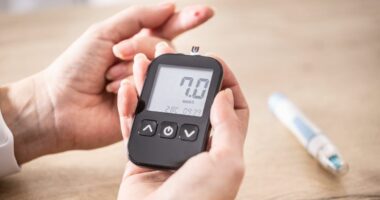Share this @internewscast.com
Do you have a messy room? Do you forget things? Do you get overwhelmed by decision-making? Do you lose focus or daydream? You might have undiagnosed ADHD (Attention Deficit Hyperactivity Disorder). At least, that’s what TikTok says.
Search for ADHD on the social media platform, and you will find over four million posts from influencers promoting productivity apps, sleep apps, holistic remedies, and even ADHD tests claiming to diagnose you.
One such influencer is Nik Hobrecker, from Germany, who describes himself as an ADHD Lifestyle Mentor – and who runs the TikTok account ADHDvision.
His account is followed by more than 1.8million people, and 12.4million people have viewed his video titled ‘Unknown ADHD Behaviours’.
In it, he claims to identify a common ADHD ‘symptom’: ‘Instead of listening to the newest hits, you often love listening to the same song on repeat because when it plays you reduce anxiety and increase dopamine.’
Hobrecker is partnered with an ‘ADHD-friendly’ soundscape app which he promotes on his account – all while posting content that suggests even the most tenuous behaviours could be signs of the condition. The app is listed as free, but upon downloading, users must pay up to $99.99 for an annual subscription.

Some people think messiness is a sign you might have ADHD – but diagnosing the condition is not that simple (picture posed by model)


Nik Hobrecker, who describes himself as an ADHD Lifestyle Mentor, is followed by more than 1.8million people
But Hobrecker is just one of an explosion of TikTok of influencers who give the impression they are able to ‘diagnose’ viewers with the disorder – which even trained psychiatrists say is one of the hardest to diagnose as many of its symptoms could point to other conditions. Hobrecker did not respond when approached for comment by the Mail.
An investigation in July last year found that at least 196,000 adults were on waiting lists for ADHD assessments across the UK. In some areas, backlogs are so severe that it would take eight years or more to clear them at current assessment rates. A study published last month found prescriptions for ADHD drugs have increased 18 per cent every year since Covid, citing TikTok as a key factor behind the rise in people seeking assessment, diagnosis and treatment.
Dr Marios Adamou, the longest-serving consultant psychiatrist treating adult ADHD in the NHS since 2005, told the Mail this week: ‘The TikTok videos are concerning. First, people could be led to identify with a medical diagnosis that they don’t have. Second, they may receive a diagnosis that they shouldn’t have. Third, they might receive treatments that are potentially harmful,’ he says.
Dr Adamou insists that an ADHD diagnosis is among the ‘most difficult to make’.
‘Having a symptom of ADHD does not mean you have ADHD. That’s rule number one. A symptom of ADHD is inattentiveness. That can come from depression, bipolar, thyroid problems, bad sleep, dementia, delirium.
‘Rule number two is just because you have behave in a certain way, doesn’t mean that’s a symptom. The clinician will determine what is a symptom based on their assessment.’
Dr Adamou also says that symptoms must be present all the time and they must cause serious impairment in at least two or more domains of a person’s life to indicate ADHD, for example: being easily distracted, finding it hard to listen to what people are saying or to follow instructions and forgetting everyday tasks, like brushing teeth or putting on socks.
Crucially, a person must have enough of them to meet the threshold for diagnosis.
What complicates matters is the lack of an official list of symptoms, though doctors have recognised as many as 18.
‘Self-diagnosis of ADHD is impossible,’ Dr Adamou says.
But it seems warnings from medics like Adamou have had little effect on the Gen Zers who follow TikTok influencers.
Elsa*, 26, follows ADHDvision, among other ADHD accounts, and says the videos resonate with her. ‘As a child I used to be quite messy and my handwriting was quite bad,’ she tells me.
‘Just yesterday I left work without my Airpods case and then burned my kale in the oven that same evening.
‘I also bite my cuticles, which I read could be a sign of ADHD.’ Elsa has self-diagnosed already and is planning to get a professional diagnosis.
Meanwhile Mark*, 27, started seeing ADHD on his social media and believes he has it. His biggest symptom, he says, is impulsively wanting to alter the course of his life to do something else.
‘It’s useful to have something to label those thoughts with rather than perceiving them as this genuine sense of existentialism because I do have them a lot,’ he says.
It seems TikTok’s controversial algorithm is signposting young people seeking answers – and potentially providing misinformation in response.
What the TikTok influencers do is also of concern.
One TikTok account called ADHD_Love, with 1.1million followers, is run by a couple from the UK who built an app for people with ADHD.
One of their videos is titled ‘ADHDers can be found…’ followed by a list of general behaviours that it seems could apply to anyone, such as: ‘nodding enthusiastically to verbal instructions they know they will instantly forget’ or ‘buying their third pair of headphones in 2025 and immediately misplacing them’. The account did not respond when approached for comment by the Mail.
It is unlikely these behaviours would stand up to scrutiny from a medical professional.
Meanwhile Olivia Lutfallah, a Canadian influencer with almost half a million followers, posts videos talking about ‘the good, the bad and the ugly of ADHD’.
In one of her videos, she describes the positive effects of taking a supplement called L-Tyrosine – an amino acid that the body uses to produce dopamine, stress response hormones, thyroid hormones and melanin. The evidence for how much it can help to manage ADHD is disputed and it is not regarded as a replacement for clinical treatment.

Olivia Lutfallah, a Canadian influencer with almost half a million followers, posts videos talking about ‘the good, the bad and the ugly of ADHD’

Lutfallah has a partnership with Amazon which earns her a commission fee when anyone buys from her curated list of ‘ADHD essentials’
Lutfallah’s video has been watched 1.3million times, but it seemingly does not include a disclaimer that people may want to speak to a doctor or check it is safe to take alongside other medication. Nor does it appear she mentions the possible side effects of the supplement, which includes nausea, headache, overstimulation, anxiety, fatigue and heartburn.
Lutfallah has a partnership with Amazon which earns her a commission fee when anyone buys from her curated list of ‘ADHD essentials’. And her online storefront features a $22 tub of L-Tyrosine capsules.
In 2022 a study published in the Canadian Journal of Psychiatry found that 52 per cent of the 100 most popular videos on TikTok about ADHD were misleading. Lutfallah did not respond when approached for comment by the Mail.
Louise, 44, works with autistic children at a primary school and is mother to 18-year-old Alexa and 20-year-old Matthew, both of whom were diagnosed with ASD (Autism Spectrum Disorder) as young children.
‘My two seem to have both self-diagnosed ADHD, and that is from TikTok,’ she tells me, adding that they are both ‘very much’ hoping for additional formal diagnoses of ADHD.
‘Alexa did have an ADHD test two years ago with CAMHS, the children’s mental health service,’ Louise says, ‘and they said she didn’t have ADHD.’
‘At one point, my son said to me, ‘you have undiagnosed ADHD, Mum.’ But the traits that I see in myself were things that you’d just shut up and get on with. You know, ‘keep calm and carry on’,’ she says.
‘I want my children to talk about their feelings. I want them to find things that are relatable,’ she says. ‘But they need to speak to someone medical.
‘I think it’s scary that people are taking [TikTok advice] instead of medical advice, and that medical advice is becoming harder and longer to get because of this.’
However, it would be unfair to blame the shocking rise in ADHD diagnoses solely on the ‘TikTok effect’.
According to Dr Adamou, the introduction of online assessments during lockdown and the NHS Right To Choose scheme in 2018 has been damaging.
The Right To Choose scheme allows patients who are on a long waiting list to request treatment from private providers, contracted and paid for by the NHS.
‘I advised NHS England not to open up this scheme to ADHD because I knew that there were not enough experts in ADHD in the country to navigate the demand,’ he says.
‘Their professionals are ill trained, patients expect to be diagnosed, and assessments are all done online,’ Dr Adamou says of the private clinics. ‘These are the ingredients of a disaster.’
‘We had a case of a lawyer, went to a very good law school, doing very well. Someone diagnosed her with ADHD, gave her some stimulants.’
Dr Adamou says his clinic tested her to understand the severity of her symptoms.
‘She does the test without the medication? Normal performance. She does the test with the medication? Outside the norm, increased performance.
‘She was using the medication to increase her cognitive performance – doping herself,’ Dr Adamou says.
A Panorama documentary in 2023 investigated some private providers contracted by the NHS and revealed just how easy it was to get a diagnosis from a psychiatrist who is not an ADHD specialist.
The reporter was assessed by an ADHD specialist at an NHS clinic for over three hours, who found he did not meet the threshold for ADHD.
However, a private clinic diagnosed that same reporter with ADHD within 45 minutes after asking him a ‘yes/no’ questionnaire.
A second private clinic diagnosed him in under two hours on a Zoom interview. Both clinics then recommended he take stimulants – powerful amphetamine-based drugs.
This questionnaire is known as a ‘validating assessment’ Dr Adamou explains. ‘They’re not there to probe and see if you do or you don’t have ADHD. They’re there to say, you’re right,’ he says.
These assessments are made up of closed questions for the patient. If they answer ‘yes’ to enough of them, they will end up diagnosed. At Dr Adamou’s clinic, he says patients are assessed for ADHD for up to four hours in person.
‘I have huge concern for vulnerable young people,’ says PR director and documentary producer Hayley Walsh, 41, who got diagnosed with ADHD last year.
Hayley saw adverts on social media selling ashwagandha – a plant used in traditional Indian medicine – and asked her doctor if she could take it. The GP warned her not to because it would interfere with other medication she was taking.
‘I’m 41 – and I’m vulnerable to those social media ads,’ she says. ‘For young people, how do they know? They might just go online and order something, even if they think they’re being holistic,’ she says.
Dr Adamou questions whether many of the influencers preaching about ADHD actually have the condition themselves, given the number of private clinics readily handing out concerning diagnoses.
‘They could be sharing misinformation unknowingly, because someone has told them they have this diagnosis from doing some checklist,’ he says.
‘This is misinformation heaped on top of misinformation.’
With all the unqualified people jumping on the ADHD diagnosis train, it is the people who actually do have a medical ADHD diagnosis who are left debilitated until they get the care they need.
Mia, 28, does not use TikTok and is waiting for a formal diagnosis through the NHS but knows it will be years before she is assessed, let alone treated.
‘Everyone puts off deadlines, everyone procrastinates but it does not, for everyone, affect their life on a level that’s really quite extreme.
‘When you have a task to do, to be able to sit down and do it, I’ve never once done that in my entire life,’ she says.
‘If everyone claims to have it, it takes away from the people who really struggle with it and really do need help.’
As thousands of people continue to add their name to the waiting list to find out if their tendency to be impulsive or forgetful can be explained by a diagnosis, it is the people suffering these symptoms most acutely who are being left behind.
*Names have been changed to protect anonymity















